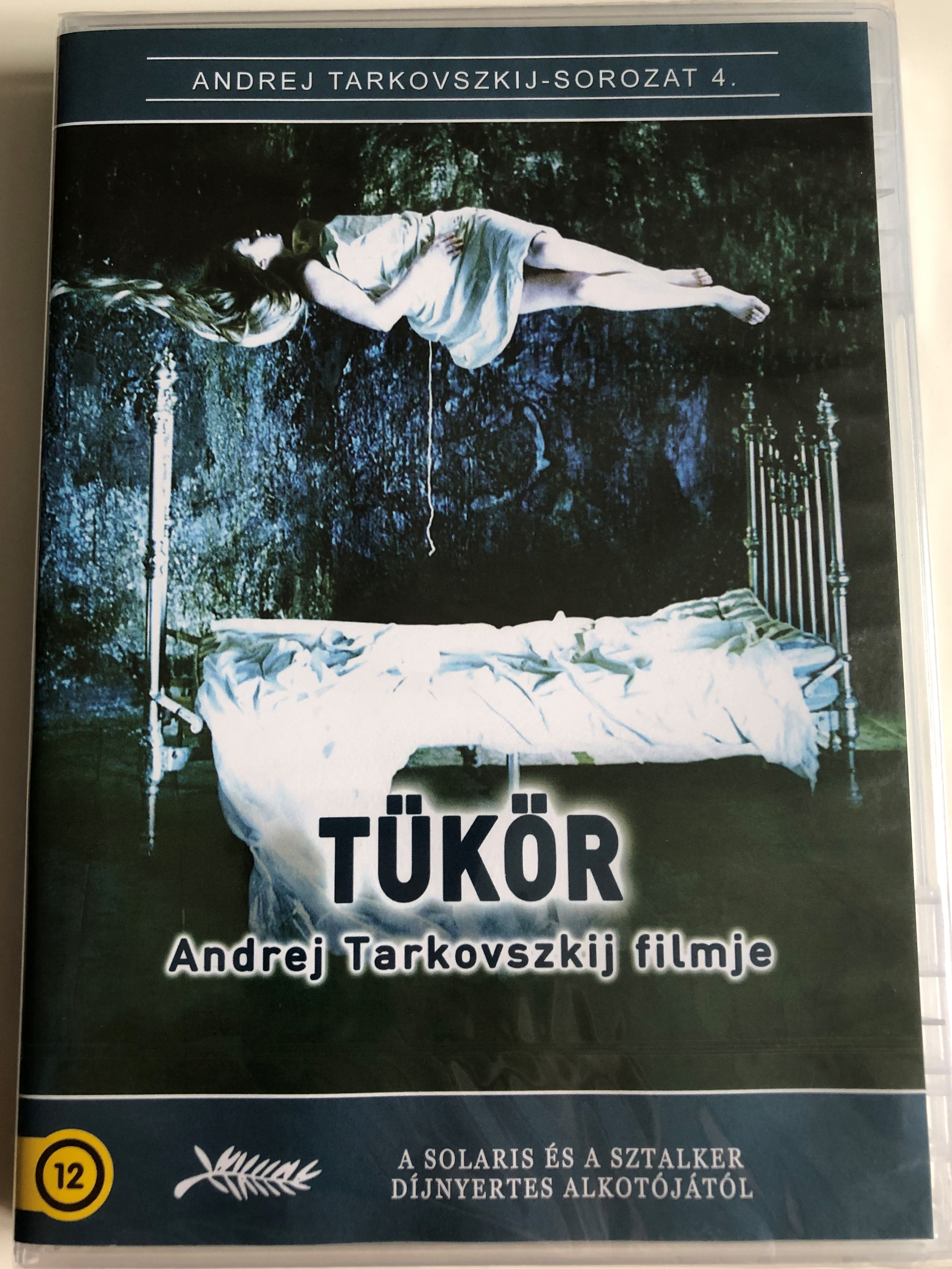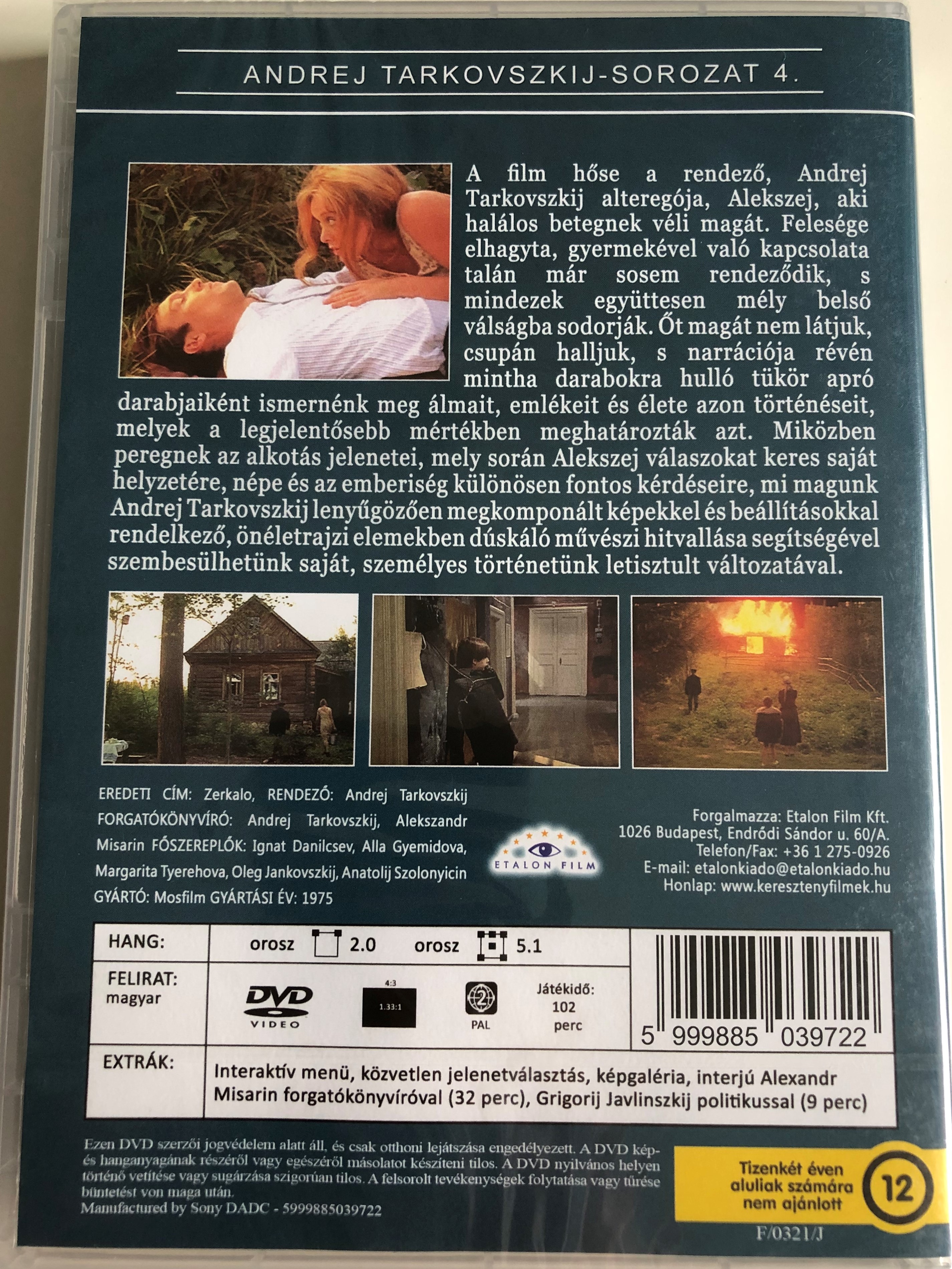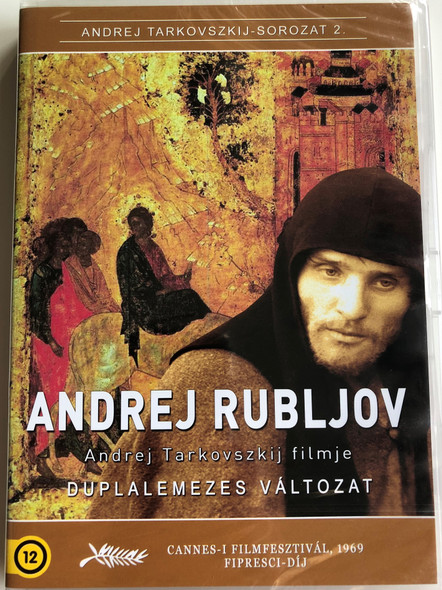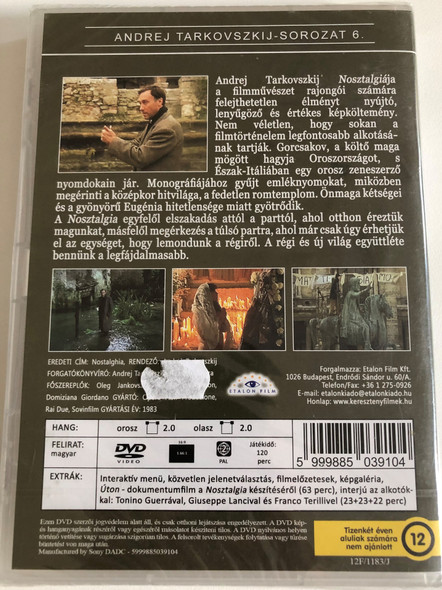Description
Zerkalo DVD 1975 Tükör (Mirror) / Directed by Andrei Tarkovsky / Starring: Margarita Terekhova, Ignat Daniltsev, Larisa Tarkovskaya, Alla Demidova, Anatoli Solonitsyn, Tamara Ogorodnikova / Andrej Tarkovszkij - Sorozat 4.
UPC 5999885039722
REGION 2 PAL DVD
MADE IN HUNGARY
AUDIO: Russian 2.0, Russian 5.1
SUBTITLES: Hungarian
Runtime: 102 minutes
Russian Summary:
«Зе́ркало» — во многом автобиографичный фильм Андрея Тарковского.
Игнат (Игнат Данильцев) смотрит телевизор, где показывают, как врач лечит сильно заикающегося юношу. События происходят в трёх временных пластах: до, во время и после войны. Фильм состоит из сновидений и воспоминаний Алексея. Воспоминания и сны касаются в основном матери, деревенского дома, где Алексей провёл детство, а также жены Алексея Натальи и его сына Игната. Главные события в жизни героя — развод родителей, послевоенное детство — поданы плавно, события постепенно сменяют друг друга, чередуясь с кадрами кинохроники. Семейные разговоры придают уют картине, в финале — неторопливый разговор юных родителей Алексея о ребёнке, которого они ещё только ждут. Главный герой повествования — Алексей — находится в кадре, только будучи ребёнком. Взрослым в «полный рост» он не показан: мы слышим его голос (И. Смоктуновский), видим его руки и его самого (возможно, на смертном одре) — камера смотрит словно бы его глазами. В фильме много документальных вставок: Гражданской войны в Испании, Великой Отечественной, пограничного конфликта с Китаем, запуска советских стратостатов. Фильм сопровождается звучащими за кадром стихами Арсения Тарковского в исполнении автора, музыкой Баха, Пёрселла и других композиторов.
English Summary:
Mirror (Russian: Зеркало, romanized: Zerkalo; known in the United States as The Mirror) is a 1975 Russian art film directed by Andrei Tarkovsky. It is loosely autobiographical, unconventionally structured, and incorporates poems composed and read by the director's father, Arseny Tarkovsky. The film features Margarita Terekhova, Ignat Daniltsev, Alla Demidova, Anatoli Solonitsyn, Tarkovsky's wife Larisa Tarkovskaya and his mother Maria Vishnyakova. Innokenty Smoktunovsky provides voiceover and Eduard Artemyev the incidental music and sound effects.
Mirror is structured in the form of a nonlinear narrative. It unfolds as an organic flow of memories recalled by a dying poet (based on Tarkovsky's own father Arseny, who in reality would outlive his son by three years) of key moments in his life both with respect to his immediate family as well as that of the Russian people as a whole during the tumultuous events of the twentieth century. In an effort to represent these themes visually, the film combines contemporary scenes with childhood memories, dreams, and newsreel footage. Its cinematography slips, often unpredictably, between color, black-and-white, and sepia. The film's loose flow of visually oneiric images, combined with its rich – and often symbolic – imagery has been compared with the stream of consciousness technique in modernist literature.
The main concept of Mirror dates as far back as 1964. Over the years Tarkovsky wrote several screenplay variants, at times working with Aleksandr Misharin. Their mutually developed script initially was not approved by the film committee of Goskino, and it was only after several years of waiting that Tarkovsky would be allowed to realize the project. At various times the script was known under different names, most notably Confession and A White, White Day. The completed film was initially rejected by Goskino, and after some delay was given only limited release in the Soviet Union.
Mirror initially polarized critics and audiences, with many considering its narrative to be incomprehensible. The work has grown in reputation since its release, and ranked nineteenth in Sight & Sound's 2012 critics' poll of the best films ever made, and ninth in the directors' poll. It has also found favor with many Russians for whom it remains their most beloved of Tarkovsky's works.
Hungarian Summary:
Egy középkorú férfi visszaemlékezik életére, gyermekéveire, családjára, kapcsolataira. Az emlékezet mozaikcserepei, mint tükörcserepek hullnak szét az időben. Az emlékezés előhívja a múltból azokat az alapvető etikai és morális problémákat, amelyek a tudatalattiból törnek a felszínre. Az önmagával való szembenézés, a permanens önreflexivitás állandó meditatív állapotot eredményez, amely szükségszerűen vezet el a tökéletes szellemi abszolútum, a hit kérdéséhez. Tarkovszkij önéletrajzi elemekkel átszőtt alkotása hitvallás a művészetnek az emberi lélekre gyakorolt hatásáról és a művészek morális felelősségéről.
Cast / Szereplők / В ролях
- Filipp Yankovsky as the child Alexei
- Ignat Daniltsev as the adolescent Alexei and Ignat, Alexei's son
- Innokenty Smoktunovsky as the adult Alexei (voice only)
- Margarita Terekhova as the young Maria/Masha/Maroussia, Alexei's mother, and Natalia, Alexei's wife
- Maria Vishnyakova as the elderly Maria
- Oleg Yankovsky, Alexei's father
- Alla Demidova as Liza, Maria's friend at printing house
- Anatoly Solonitsyn as Forensic doctor & pedestrian
- Tamara Ogorodnikova as Nanny and Strange woman at the tea table
- Larisa Tarkovskaya as Nadezhda, Alexei's neighbor
- Arseny Tarkovsky as Narrator/Poet (voice only)
- Olga Kizilova as the redhead girl
| Directed by | Andrei Tarkovsky |
|---|---|
| Produced by | Erik Waisberg |
| Written by |
|
| Starring |
|
| Narrated by | |
| Music by | Eduard Artemyev |
| Cinematography | Georgi Rerberg |
| Edited by | Lyudmila Feiginova |
|
Release date
|
|
|
Running time
|
102 minutes |
| Country | Soviet Union |
| Language | Russian, Spanish |























